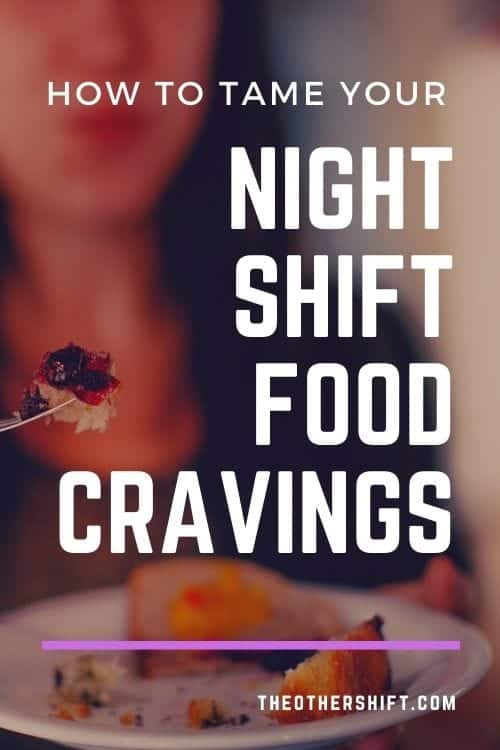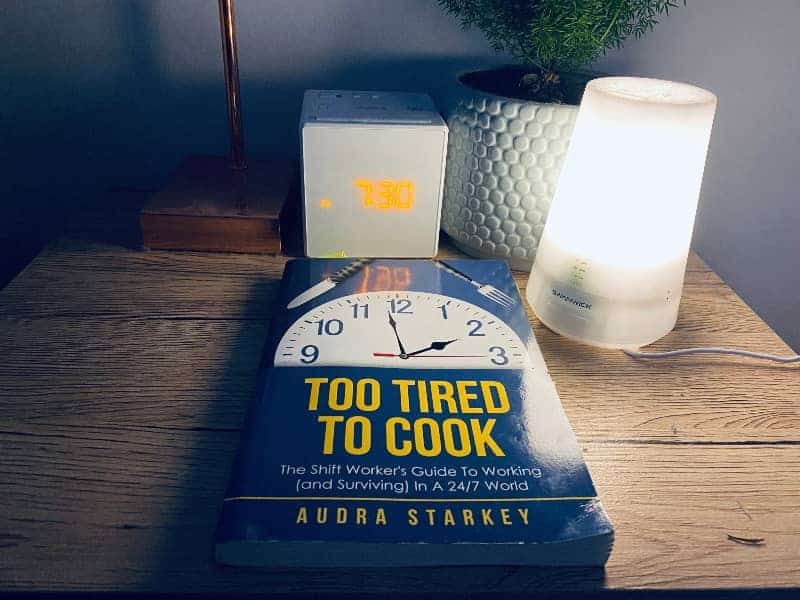Disclosure: This page may contain affiliate links, meaning we receive a commission if you decide to make a purchase through our links, but this is at no additional cost to you. Please read our disclosure and privacy statement for more info.
It has already been a long shift and you still have three hours to go. You are feeling some type of way and craving that candy bar you know is in your bag. You grab it and bite in. At first you are flooded with a sense of comfort, but almost as quickly as it came you are back to feeling the same way you did moments ago. Working the night shift can contribute to your cravings in a variety of ways.
Night shift food cravings occur in response to something in your environment, internal or external, such as physical and mental stress, hormones, lack of sleep and nutrient deficiencies. Removing food temptations and making healthy substitutes can minimize a desire to eat whilst on night shift.

Food cravings can be frustrating because they detract from our mental and physical health and make it harder to feel your best while working the night shift. In this post we are going to explore what causes food cravings and why they might get worse when you work night shift, and importantly how you can take control of your cravings. Make sure you read to the end for seven tips to help you kick your cravings!
Night Shift Food Cravings
Food cravings are super common. According to a study conducted in 2016, over 90% of adults report experiencing food cravings from time to time. And once a craving hits you it can be really hard to deny it, but acting on your food cravings can have real, long-term consequences including:
- An increased risk for blood sugar spikes and crashes
- A higher chance of weight gain
- Increased gastrointestinal dysregulation
- Added strain on your relationship to food
- Decreased dental health, particularly among those with strong sugar cravings
- A higher risk of developing an eating disorder such as Binge Eating Disorder (BED)
Paradoxically, the adverse effects of giving into your food craving can also contribute to the challenges of making it through a night shift. While the 3rd shift itself can make you more likely to experience food cravings by increasing your exposure to common triggers.
Needless to say, this is why we felt it was so important to tackle this topic!

What Causes Food Cravings Overnight
A food craving is essentially the manifestation of your brain’s response to some kind of trigger. Since multiple different parts of your brain can trigger a craving there are a lot of different reasons you might be jonesing for a particular food item.
Some common triggers for cravings include physical stress, mental stress, hormones, our circadian rhythms, and the power of suggestion.
Physical Stress
As night shift workers we are susceptible to physical stress like exhaustion and dehydration, but there are also a few other surprising physical stressors that can trigger food cravings that we think you should know about.
Exhaustion
Going over the most obvious one first, well it’s obvious because we are all well aware of how exhaustion factors into our lives as shift workers.
Lack of sleep can trigger cravings by inducing a hormone dysregulation. Essentially what happens is, your body becomes stressed by your lack of sleep, leading your brain to send you hunger signals in hopes that eating something will boost your energy levels and offset the impacts of sleep deprivation.
Some scientists hypothesize that this response is related to an ancient survival instinct that drove people to eat when food was available, or to push-through if they needed to survive without sleep in order to escape a saber-tooth or something.
While this has become maladaptive in an age of food surplus and domestic cats, your body may still be processing your night shift as though it were a threat.
Dehydration
It is so easy to succumb to dehydration when you are working night shifts. When this happens, some people will experience food cravings instead of thirst.
According to Dr. John Higgins (MD), the chief cardiologist at Lyndon B. Johnson General Hospital, when you are dehydrated it can become difficult for your body to release stored glucose, since water is vital to transporting your energy stores. This disconnect can cause you to feel hungry and crave food, especially sweets.
It is also highly possible that folks with chronic cravings have simply gotten their signals crossed and have come associate thirst with hunger. Next time you find yourself reaching for a Kit-Kat, consider drinking a glass of water instead. We use the BEAST tumbler and it’s amazing. See our full review here or watch the video below.
Microbe Manipulation
This is a cause of cravings that really shocked us, but there is evidence suggesting that the bacteria in our guts can manipulate us to crave what they need, even if it isn’t what our bodies need.
Professor Athena Aktipis of Arizona State University explains that the various microbes in our body all have a preferred environment. Some like it acidic, for example, and what we eat affects their ecosystem. So, they manipulate us in to fostering that ecosystem in two main ways:
- By sending signals to our brains via the vagus nerve to reward us for eating certain foods and to make us feel sick when we don’t eat what they want us to.
- By hijacking our taste receptors to prefer the taste of the foods they want us to consume more of.
In general, “good” bacteria will ask you to feed them healthier foods, while “bad” bacteria may tempt you to eat too much sugar or salt.
Night shift workers may make easy prey for these manipulative microbes because, unless your meal-prep properly, your options for food during your shift may be limited to exactly what the bad microbe community wants, making it harder to resist their requests.
The key, then, is to foster good gut bacteria that will encourage and enjoy health foods so that, these microbes dominate your gut population and influence your cravings in healthier ways.
If you want to learn more about your gut health in a fun way, I am ready a terrific book at the moment called “GUT” by Giulia Enders. Here is a picture of the cover below. Check it out on Amazon here (I have the 2017 version but the link is to the 2018 updated version).

Nutrient Deficiencies
It is common wisdom that we get cravings when our bodies need additional nutrients. But this logic doesn’t apply when our cravings include junk food, because if we are being absolutely honest, there is no nutritional value in a package of biscuits.
Truth be told, this may have been the evolutionary foundation for cravings, but in today’s day and age we tend to base what we eat more on our culture, habits, and lifestyle than we do any kind of subconscious instinct.
That said, if you find yourself caving steak despite being a vegetarian, you may truly have an iron deficiency. Of course, the best way to find out if nutrient deficiencies are causing your cravings is to visit your doctor and have bloodwork done.
Mental Stress
Hopefully we aren’t stressing you out too much by presenting this information, because mental stress can also contribute to your cravings, so let’s talk about some common mental stressors that night shift workers may experience.
Emotional Stress
Intense emotions, both positive and negative, are considered stressful. It follows that intense emotions can trigger food cravings, even if you’re just really, really happy about something.
These types of cravings are often reinforced by our eating habits. When we feel down we reach for a comfort food, hoping it will sooth us. On the flip side when we have done something good we often reward ourselves with a treat.
So, if you find yourself craving something it might be good to check in and see how you’re feeling or identify what you’re feeling. Sometimes if you can address that consciously your craving will lose its intensity.
Work-Related Stress
Shift workers come up against a lot of work-related stress, particularly shift workers in high-stress occupations. Since our jobs tend to be fast-paced, we generally do not get an opportunity to deal with stress constructively as it comes our way, even if we are good at managing high stress loads.
This can trigger our bodies to respond by feeling threatened, which triggers the brain to engage in things it thinks will help us survive, like eat. Unprocessed stress can therefore trigger cravings.
It is important to engage in proper self-care after work to reduce your work-related stress in order to lessen your susceptibility to work-stress-cravings.

Eating Disorders & Mental Health Concerns
Eating disorders are a mental health concern and if you are affected by an eating disorder like Binge Eating Disorder or Bulimia Nervosa you may find yourself unable to control your cravings. This is because your cravings are a symptom of the eating disorder.
If you suspect you are suffering from an eating disorder that is causing you to have intense cravings, please speak to a health care professional right away, or contact the National Eating Disorder Helpline.
Other mental health disorders can also cause cravings. It is always a good idea to talk to a mental health professional if you are confronting a mental health disorder.
You may also like: Night Shift and Depression. Are They Linked?
Hormones
We’ve already talked a little bit about how hormone dysregulation can trigger or contribute to food cravings. Some hormonal conditions will impact cravings more than others, like:
Pregnancy
We have all heard about pregnancy cravings at one point, even if we’ve never been pregnant ourselves. After all, it’s basically the whole plot of Rapunzel.
Being pregnant and working the night shift is hard enough, without it causing you excessive cravings! While weight gain may not be as much of an issue during pregnancy, unhealthy cravings can still have adverse side effects, so it is still a good idea to keep track of your cravings and try to redirect them if they get too junky.
You may also like: 7 Tips for Surviving Night Shifts Whilst Pregnant
PMS
Women are somewhat stereotypically known for craving chocolate before and during their periods. While this is certainly not the case for all women, it is true that menstrual cycles can play a role in our food cravings and hormones are the primary culprit.
The hormonal changes that occur right before a period are designed to increase appetite. It takes a lot of energy to prepare a body for a potential pregnancy. Additionally, period blood tends to be nutrient rich, meaning women are losing a lot of nutrients during their period and it is not uncommon for this nutrient loss to trigger cravings.
You may also like: Does Shift Work Affect Your Period? Tips for Staying Regular
Leptin & Ghrelin Imbalances
Leptin and Ghrelin are the two hormones most responsible for regulating your appetite. If either are out of balance you are probably going to experience food cravings because your body will not be able to properly decipher hunger and fullness signals.
If you suspect any of these hormonal issues are causing you to experience persistent and/or unwanted food cravings contact your doctor to discuss possible strategies to put your hormones back in balance.
I learnt all about our gut hormones through this incredible book. See it here for a very reasonable price on Amazon

Circadian Rhythms
We talk about circadian rhythms a lot on our blog because they really are a core part of the challenges we face when working night shifts. And surprise, surprise, it factors into our cravings too.
A study published in the journal Obesity discovered that our circadian rhythm increases our cravings for junk food in the evenings. This urge to eat high-calorie foods at night may have, again, helped our ancestors increase energy storage so they could survive times of famine, but for us this instinct tends to result in obesity and heart disease.
As night shifters, our circadian rhythms are already working against us by make us tired, and therefore more likely to crave junk. Given the fact that we are also going to be eating the vast majority of our meals during the timeframe when our bodies are instructing us to eat higher calorie junk, we are fighting an uphill battle when it comes to the motivation to eat healthy and suppress cravings.
You’ll also like this blog: Does Night Shift Shorten Your Life? 10 Impacts of 3rd Shift
The Power of Suggestion
The last common craving trigger we are going to talk about is the “power of suggestion” which comes in a few different forms:
Memory
Our memories store information about the foods we eat and how they make us feel, to the point that we subconsciously associate certain foods with pleasurable activities.
For example, if you are used to munching on popcorn while you watch your favorite TV drama, you are likely going to start craving popcorn every time you sit down to watch TV. This means your context is effectively suggesting food cravings to you.
Professionals call this eating context and noticing it can be an important part of practicing mindful eating.
Visual Ques
Walking past the vending machine and noticing your favorite snack can be a sure-fire way to trigger a craving. Visual ques like this work by reminding your brain that your favorite snack exists and triggering a fixation on it that translates into an intense food craving.
Visual ques can include anything from seeing your coworker eat an ice cream, to watching a commercial about soft drinks and they can really catch you off-guard.
Other sensory ques can work this way too. If you have a strong sense of smell, for example, you might find that the scent of your favorite crisps will trigger a craving for them.

Language
This one is an odd one, but language can contribute to your experience of cravings. Only two-thirds of the languages have a word to describe cravings. Even if a word for craving exists it tends to apply to addictive substances and not to food.
According to Professor Nicole Avena, a neuroscientists at the Mount Sinai School of Medicine, if you can articulate that a craving exists you are able identify or define it, and therefore experience, it, talk about it, and perpetuate it.
On the flip side if you have no way of articulating a food craving you are less likely to think about it and less likely to experience it. Simply wanting a food is somehow less escapable than a craving.
How to Control Your Night Shift Food Cravings
By now it has probably become pretty clear that your candy habit might not be as innocent as you thought, and you may be wondering how to kick your cravings and take back control.
Well, since the main goal of our blog is to empower you to lead a healthy life, this post would not be complete without some tips to help you out. Here we have seven tips to help you curb your cravings.
1: Make Sure Your Needs Are Met
As explained above, if your basic needs are left unmet your body may trigger cravings in an attempt to compensate. Simply ensuring that you have gotten enough sleep, are staying well hydrated, practicing self-care, and are getting enough of the right vitamins and minerals in your diet, can go a long way towards helping you curb your cravings.
We have tons of advice to help you meet your basic needs despite the challenges presented by night shifts. If you need some extra advice, we recommend checking out these posts:
- How to Work the Night Shift and Stay Healthy
- 11 Secrets to Working a Swing Shift
- The Night Shift Power Nap: What You Need to Know
- How to Best Prepare for the Night Shift the Day Before
2: Establish a Healthy Diet
Establishing a healthy diet can help cut down on your cravings by helping you to feel full, energized, healthy, and confident.
If you are serious about establishing a healthy diet that works for you it is important to say “NO!” to toxic fad diets that are super restrictive.
When you tell yourself that a food is forbidden you give it too much power and are more likely to crave it. Super restrictive diets can also cause you to unlearn the distinction between hunger and cravings.
Incorporating mindful eating strategies into your diet and routine can also help you to learn the difference between actual hunger and cravings if you have been a chronic dieter. It’s OK to diet and subscribing to a particular dieting strategy may eve help you gain control over your cravings, but we hope you will consider more wholistic diets.
You may also like to reference some of these pasts posts for additional shift-related diet tips.
- Healthy Meals for Shift Workers (with Recipes and Videos)
- Volumetrics Diet: The Pros and Cons for Shift Workers
- Graveyard Weight Loss: Shift Workers Guide to the Keto Diet
- YouTube – If you work multiple night shifts in a row, the below video should help you out.
3: Try Emotional Freedom Techniques (Tapping)
In an episode of the podcast series, The Healthy Shift Worker, Dr. Pet Stapleton discusses how Emotional Freedom Techniques (also known as tapping or EFT), can be used to help shift workers reprogram their brains to essentially forget their food cravings. Have a listen below.
Tapping is a technique that involves stimulating specific acupuncture nerves with a gentle, but firm tapping. Tapping works by reducing stress hormone levels and supporting your nervous system, which ultimately reduces the intensity of food cravings. Dr. Stapleton has been practicing tapping with her patients for over a decade and has observed really promising results.
We found this YouTube video to walk you through a tapping technique similar to the one used by Dr. Stapleton. We also recommend checking out this guide that will show you where the nine tapping points are located on your body.
4: Make Substitutions
If you find yourself craving specific food items, like soft drinks or Kit-Kats, finding a good substitute has proven a viable strategy for some people. Some possible healthy substitutes for commonly craved foods include:
| Food Craving | Substitute |
|---|---|
| Soft drinks | Kombucha |
| Milk chocolate | Dark chocolate |
| Fruity candy | Fruit and/or Berries |
| Crisps | Nuts or roasted chickpeas |
Having these substitutions on hand can help you redirect your craving while at work.
5: Remove the Temptation
If you happen to be triggered by visual ques you can likely help control your cravings by removing the visual que or “temptation.” This could mean hiding the gummy bears at the back of your pantry or making sure not to idly walk past the vending machine during your shift.
It may not always be possible to avoid sensory triggers so if you cannot remove the trigger consider removing yourself from the triggering situation.
That could mean taking a short walk while your coworker munches on some biscuits or distracting yourself with something more absorbing.
6: Take Spinach Extract
Sounds weird but go with me.
Spinach extract is a dietary supplement that can help increase the hormones that suppress appetite. Studies have shown that taking between 3.7 and 5 grams of spinach extract with a meal can reduce the intensity of cravings for several hours.
Spinach extract tends to come in a powder form that you can easily mix into a smoothie or juice. Alternatively, you can purchase spinach extract capsules (click here to see on Amazon).
7: Try to Break Your Cravings
This tip may seem a little draconian, but you can break your cravings by interrupting your brain’s subconscious habit loop. To do this you have to associate the unwanted habit (in this case a craving) with a negative stimulus.
The Pavlok bracelet is a smart wearable that you can program to administer negative stimuli (a small shock) when you give into a craving or allow yourself to fall into an unwanted habit.
Final Thoughts: Night Shift Cravings
Cravings are frustrating, and they don’t serve us well as shift workers because they often detract from our efforts to establish a healthy lifestyle.
We hope this guide has shed some light on why nights shifts can make your cravings more intense and how you might work to curb them.

Disclosure: This page may contain affiliate links, meaning we receive a commission if you decide to make a purchase through our links, but this is at no additional cost to you. Please read our disclosure and privacy statement for more info.
Resources
- Johnson, Jon. “What causes food cravings?” Medical News Today. Edited by Kathy W. Warwick, R.D. Dec 10, 2020. Web.
- “What triggers those late-night snack cravings?” Science Daily. Apr 30, 2013. Web.
- Kam, Katherine. “Cravings: Why They Strike, How to Curb Them.” Web MD. Web.
- Brown, Jessica. “Why you shouldn’t trust your food cravings.” BBC Future. May 27, 2019. Web.
- Petre, Alina, MS. “What Do Food Cravings Mean? Facts and Myths Explained.” Healthline. Edited by Amy Richter, RD. Sept 30, 2020. Web.
- Halkier, Giulia. “How to Stop Junk Food Cravings (And Lose Weight) with EFT Tapping.” YouTube. May 2, 2020. Web.
- Wickersham, Erin, RD. “7 Easy Ways to Curb Your Nighttime Snack Cravings.” Virtua Health. Web.
- Adda, Bjarnadottir. “11 Ways to Stop Cravings for Unhealthy Foods and Sugar.” Healthline. Jan 18, 2016. Web.
- Starkey, Audra. “HSW 87: Tapping for Food Cravings, Stress and Insomnia with Dr. Peta Stapleton.” The Healthy Shift Worker. Aug. 15, 2019. Web.
Recent Posts
Night shift workers who are scouring the internet in search of a high-quality meal plan are often sadly left disappointed. Though there are endless blogs and videos to digest about what to eat, the...
Your body’s energy core runs on a circadian clock charged by the light of our sun. The different systems in your body operate on a precise schedule for optimal performance. Hormones in the brain...


